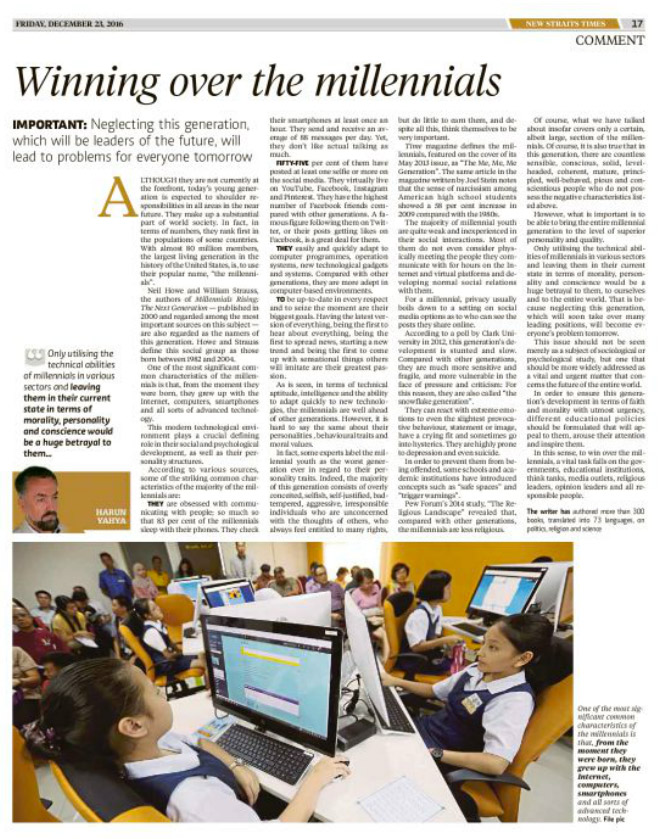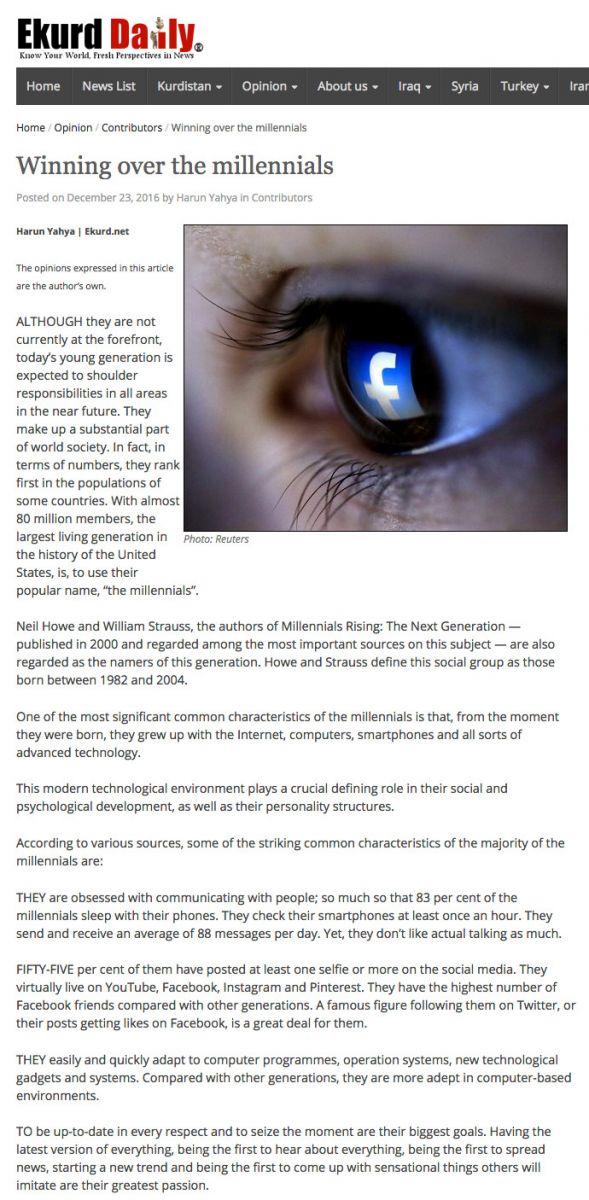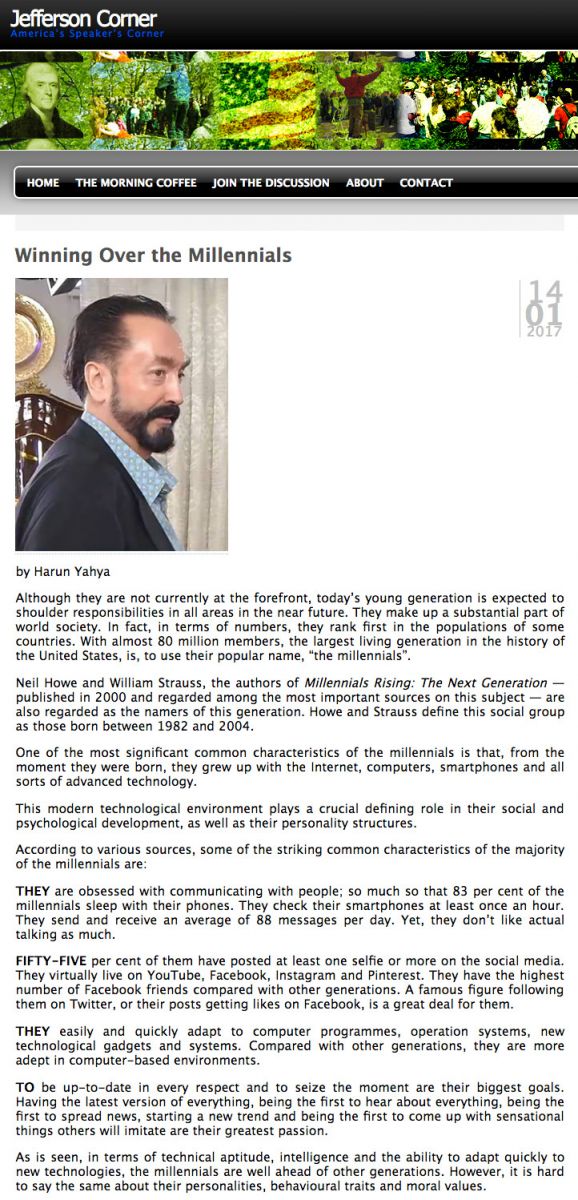
ALTHOUGH they are not currently at the forefront, today’s young generation is expected to shoulder responsibilities in all areas in the near future. They make up a substantial part of world society. In fact, in terms of numbers, they rank first in the populations of some countries. With almost 80 million members, the largest living generation in the history of the United States, is, to use their popular name, “the millennials”.
Neil Howe and William Strauss, the authors of Millennials Rising: The Next Generation — published in 2000 and regarded among the most important sources on this subject — are also regarded as the namers of this generation. Howe and Strauss define this social group as those born between 1982 and 2004.
One of the most significant common characteristics of the millennials is that, from the moment they were born, they grew up with the Internet, computers, smartphones and all sorts of advanced technology.
This modern technological environment plays a crucial defining role in their social and psychological development, as well as their personality structures.
According to various sources, some of the striking common characteristics of the majority of the millennials are:
THEY are obsessed with communicating with people; so much so that 83 per cent of the millennials sleep with their phones. They check their smartphones at least once an hour. They send and receive an average of 88 messages per day. Yet, they don’t like actual talking as much.
FIFTY-FIVE per cent of them have posted at least one selfie or more on the social media. They virtually live on YouTube, Facebook, Instagram and Pinterest. They have the highest number of Facebook friends compared with other generations. A famous figure following them on Twitter, or their posts getting likes on Facebook, is a great deal for them.
THEY easily and quickly adapt to computer programmes, operation systems, new technological gadgets and systems. Compared with other generations, they are more adept in computer-based environments.
TO be up-to-date in every respect and to seize the moment are their biggest goals. Having the latest version of everything, being the first to hear about everything, being the first to spread news, starting a new trend and being the first to come up with sensational things others will imitate are their greatest passion.
As is seen, in terms of technical aptitude, intelligence and the ability to adapt quickly to new technologies, the millennials are well ahead of other generations. However, it is hard to say the same about their personalities, behavioural traits and moral values.
In fact, some experts label the millennial youth as the worst generation ever in regard to their personality traits. Indeed, the majority of this generation consists of overly conceited, selfish, self-justified, bad-tempered, aggressive, irresponsible individuals who are unconcerned with the thoughts of others, who always feel entitled to many rights, but do little to earn them, and despite all this, think themselves to be very important.
Time magazine defines the millennials, featured on the cover of its May 2013 issue, as “The Me, Me, Me Generation”. The same article in the magazine written by Joel Stein notes that the sense of narcissism among American high school students showed a 58 per cent increase in 2009 compared with the 1980s.
The majority of millennial youth are quite weak and inexperienced in their social interactions. Most of them do not even consider physically meeting the people they communicate with for hours on the Internet and virtual platforms and developing normal social relations with them.
For a millennial, privacy usually boils down to a setting on social media options as to who can see the posts they share online.
According to a poll by Clark University in 2012, this generation’s development is stunted and slow. Compared with other generations, they are much more sensitive and fragile, and more vulnerable in the face of pressure and criticism: For this reason, they are also called “the snowflake generation”.
They can react with extreme emotions to even the slightest provocative behaviour, statement or image, have a crying fit and sometimes go into hysterics. They are highly prone to depression and even suicide.
In order to prevent them from being offended, some schools and academic institutions have introduced concepts such as “safe spaces” and “trigger warnings”.
Pew Forum’s 2014 study, “The Religious Landscape” revealed that, compared with other generations, the millennials are less religious.
Of course, what we have talked about insofar covers only a certain, albeit large, section of the millennials. Of course, it is also true that in this generation, there are countless sensible, conscious, solid, level-headed, coherent, mature, principled, well-behaved, pious and conscientious people who do not possess the negative characteristics listed above.
However, what is important is to be able to bring the entire millennial generation to the level of superior personality and quality.
Only utilising the technical abilities of millennials in various sectors and leaving them in their current state in terms of morality, personality and conscience would be a huge betrayal to them, to ourselves and to the entire world. That is because neglecting this generation, which will soon take over many leading positions, will become everyone’s problem tomorrow.
This issue should not be seen merely as a subject of sociological or psychological study, but one that should be more widely addressed as a vital and urgent matter that concerns the future of the entire world.
In order to ensure this generation’s development in terms of faith and morality with utmost urgency, different educational policies should be formulated that will appeal to them, arouse their attention and inspire them.
In this sense, to win over the millennials, a vital task falls on the governments, educational institutions, think tanks, media outlets, religious leaders, opinion leaders and all responsible people.
Adnan Oktar's piece in New Straits Times & Ekurd Daily & Jefferson Corner:
http://www.nst.com.my/news/2016/12/198931/winning-over-millennials
http://ekurd.net/winning-over-millennials-2016-12-23
http://www.jeffersoncorner.com/winning-over-the-millennials/




